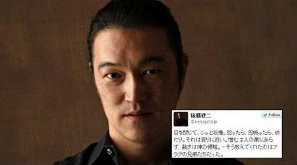Japan’s 1 percent

Earlier this year, the thugs of the Islamic State murdered a Japanese hostage named Kenji Goto, a thoughtful and even saintly Christian journalist. Goto had for years campaigned for humanitarian causes worldwide, and he found himself in Syria in a vain attempt to rescue another Japanese hostage.
Although we rarely think of Japan as a promising land for Christianity, such a case reminds us that believers do exist there. Goto himself was a convert to the United Church of Christ. Between 2008 and 2010, Japan had two Christian prime ministers in close succession, one Catholic and one Baptist, and astonishingly, these were the seventh and eighth Christians to hold that office over the past century.
Nevertheless, the number of Japanese Christians is tiny—barely 1 percent of the population, far fewer than in neighboring Asian lands. That fact teaches some comparative lessons about the religion’s appeal outside the West.




